How to reshape the vaccination campaign for the over 60. Gimbe Report
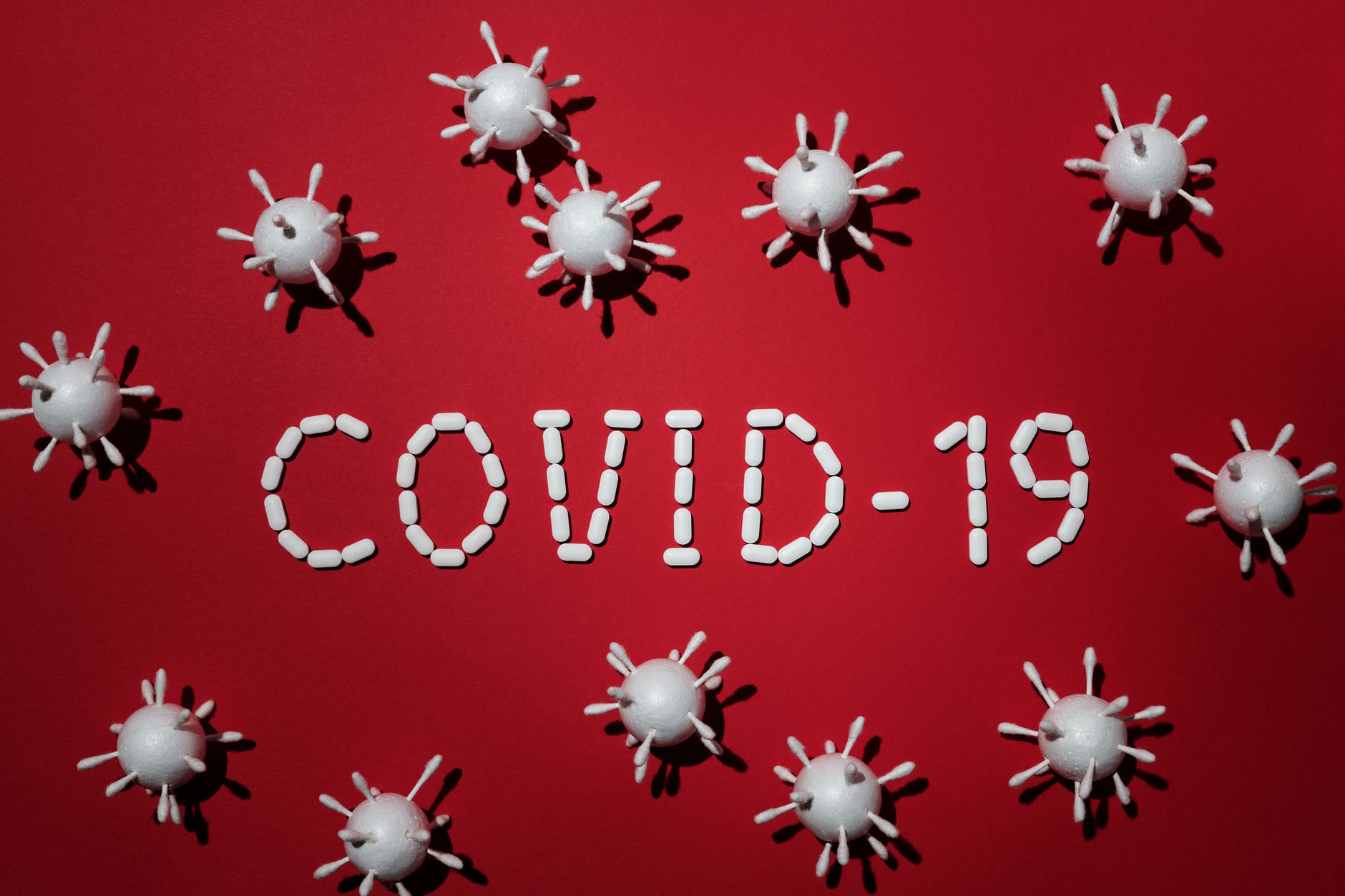
Numbers, trends, scenarios and advice of the Gimbe Foundation on the vaccination campaign in Italy
First doses: offer only mRNA vaccines, both to increase adherence to the campaign strongly compromised by the distrust of viral vector vaccines, and to prevent new vaccines from being exposed to the delta variant for the next 10-12 weeks without adequate coverage ;
Second doses:
- Pfizer-BioNTech and Moderna: administer the second dose at 21 and 28 days respectively, anticipating the recalls set at longer intervals;
- AstraZeneca: extend the Aifa authorization to offer heterologous vaccination also to over 60s (currently off label), thus allowing the second dose to be brought forward 8 weeks after the first. Alternatively, maintaining the full course with AstraZeneca, to protect those over 60 not adequately covered by the single dose against the delta variant, more stringent non-pharmacological measures should be reinstated.
These are the advice of the Gimbe Foundation to reshape the vaccination campaign for over 60s.
Here is the full report of the Gimbe Foundation chaired by Nino Cartabellotta on the progress of the vaccination campaign in Italy
+++
The independent monitoring of the Gimbe Foundation detects in the week 23-29 June 2021, compared to the previous one, a decrease in new cases (5,306 vs 7,262) (figure 1) and a stabilization of deaths (220 vs 221) (figure 2). Currently positive cases are also decreasing (52,824 vs 72,964), people in home isolation (50,878 vs 70,313), hospitalizations with symptoms (1,676 vs 2,289) and intensive care (270 vs 362) (figure 3). In detail, compared to the previous week, the following changes were recorded:
- Deaths: 220 (-0.5%)
- Intensive care: -92 (-25.4%)
- Hospitalized with symptoms: -613 (-26.8%)
- Home isolation: -19,435 (-27.6%)
- New cases: 5,306 (-26.9%)
- Currently positive cases: -20,140 (-27.6%)
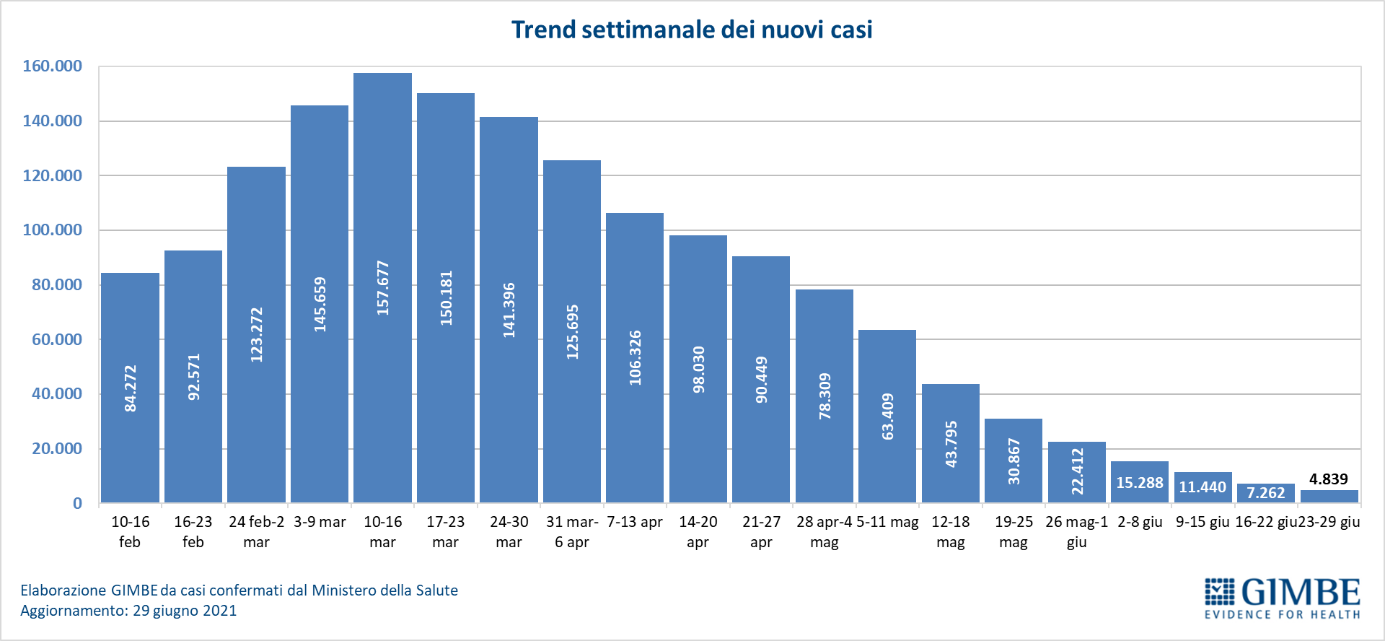
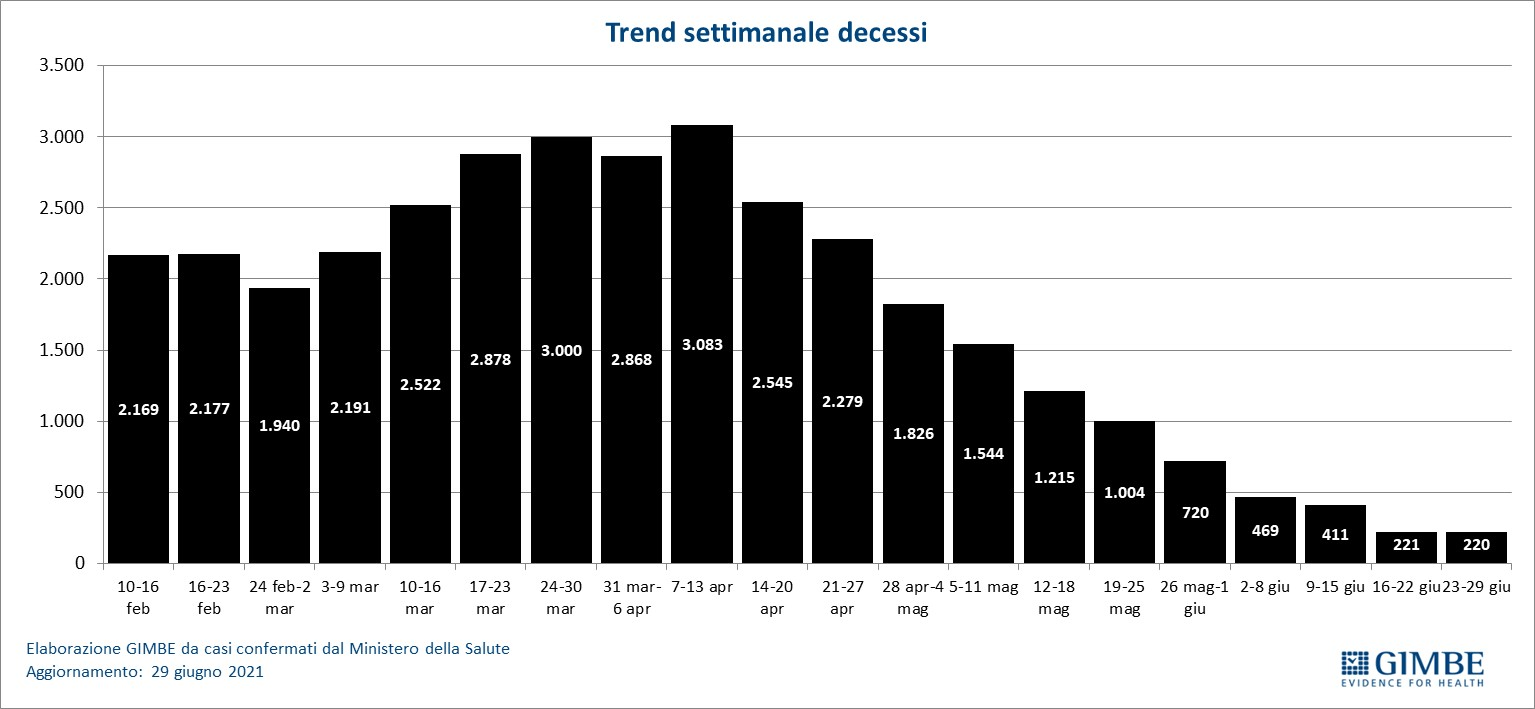
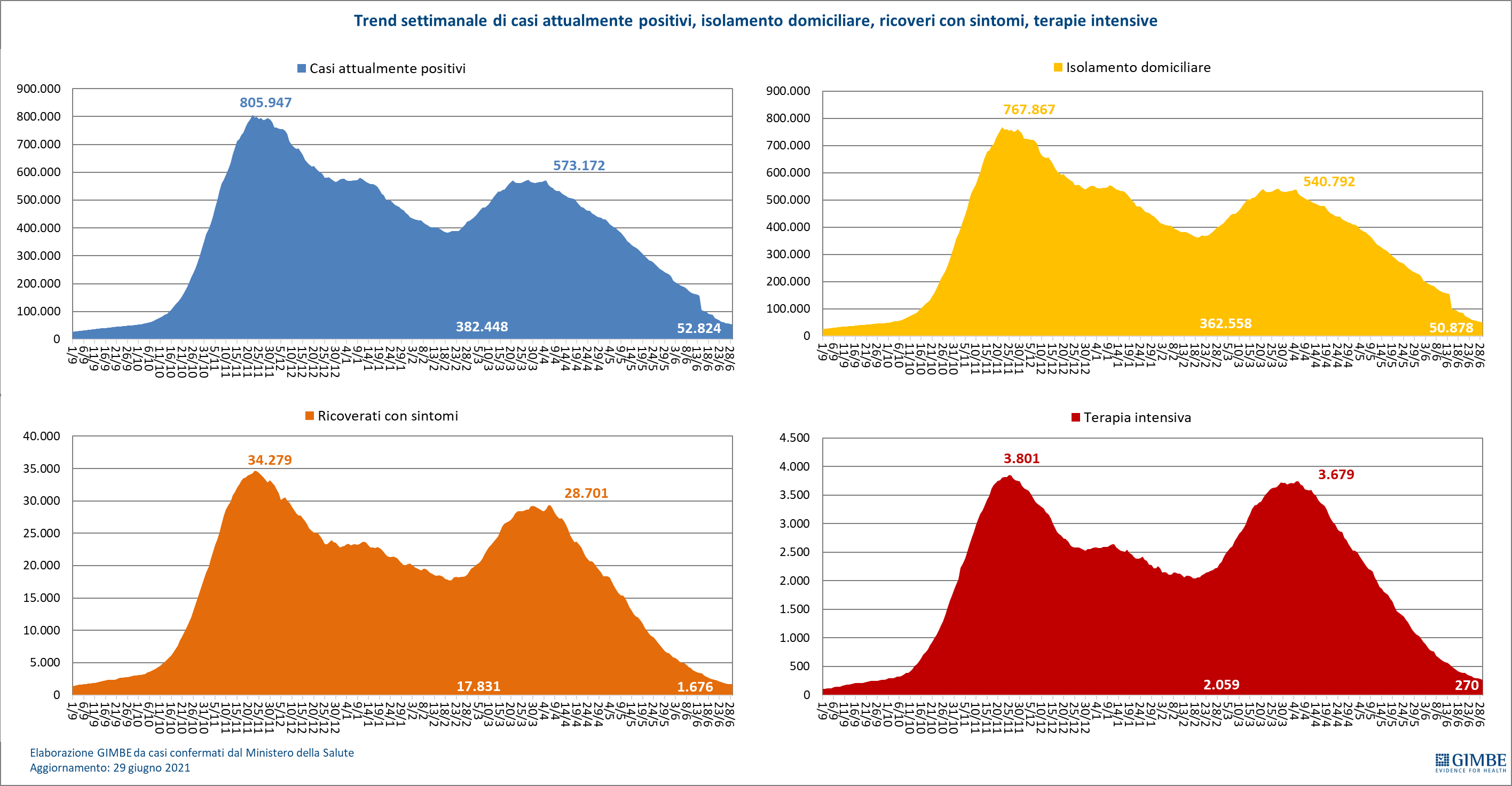
«For 15 consecutive weeks – declares Nino Cartabellotta, President of the Gimbe Foundation – there has been a decline in new weekly cases. However, we continue to notice a progressive decrease in testing activity which, we reiterate, underestimates the number of new cases and documents the insufficient tracing of contacts, crucial in this phase of the pandemic ». From the week of May 5-11, the number of people tested weekly fell progressively by 60.3%, from 662,549 to 263,213 (figure 4). In almost all the Regions, the decline in new weekly cases is confirmed, with the exception of Abruzzo and Sardinia, which however recorded negligible increases in absolute terms (table). Deaths, down for 10 consecutive weeks, stabilized in the last week at an average of 31 per day compared to 32 in the previous week.
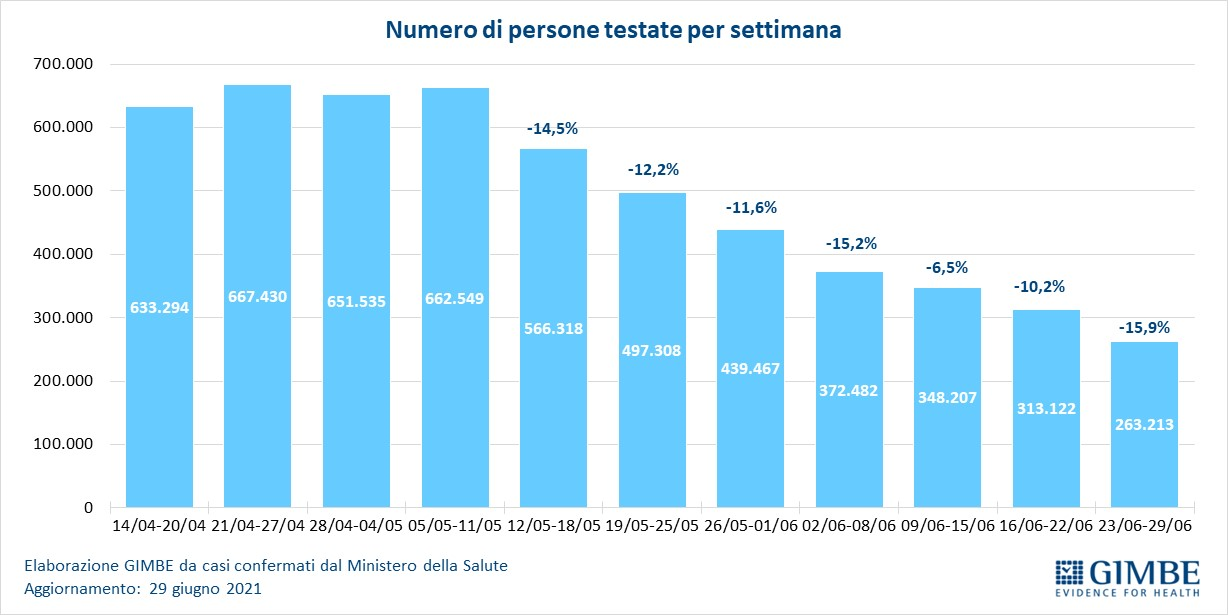
"The reduction in hospitalized patients continues, now more slowly – says Renata Gili, Head of Research on Health Services of the Gimbe Foundation – which has brought the occupancy of beds by Covid patients to 3% both in the medical area and in therapy intensive: also this week all the Regions record values of less than 10% and there are 5 Regions without Covid patients hospitalized in a critical area ».
In detail, from the peak of 6 April the number of beds occupied in the medical area fell from 29,337 to 1,676 (-94.3%) and those in intensive care from 3,743 to 270 (-92.8%). People in home isolation, from the peak of March 28, went from 540,855 to 50,878 (-90.6%). "Daily admissions to intensive care – explains Marco Mosti, Operations Director of the Gimbe Foundation – have been decreasing for the past 3 months and the 7-day moving average is 8 admissions / day" (figure 5).
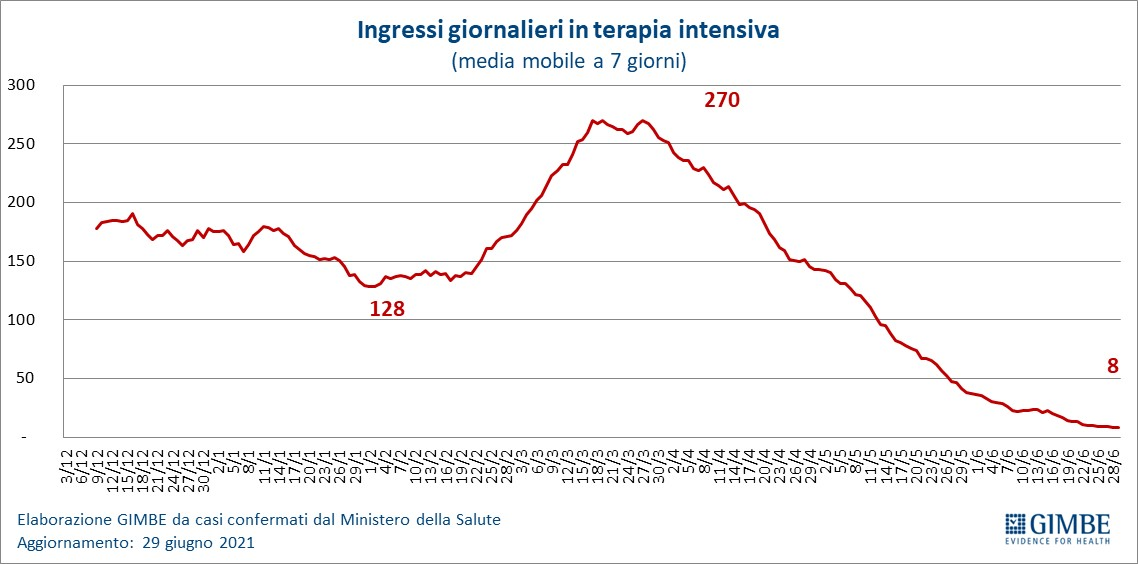
Vaccines: supplies. As of June 30 (update at 6.10) 55,302,293 doses were delivered, equal to 72.6% of those expected for the first half of 2021 (figure 6). In detail:
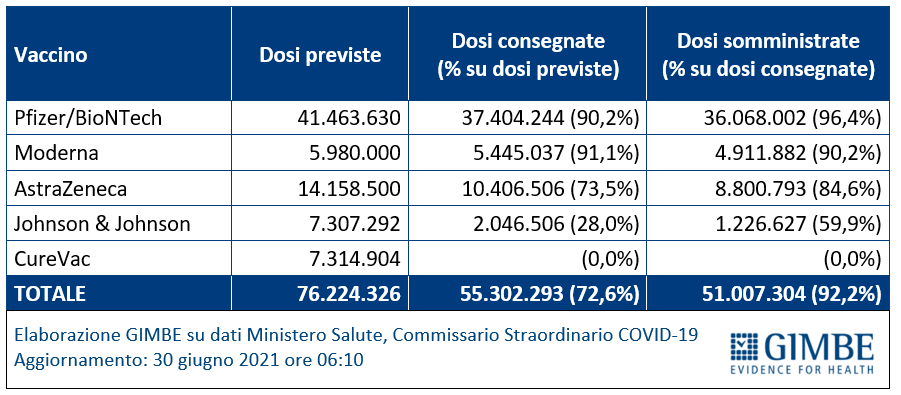
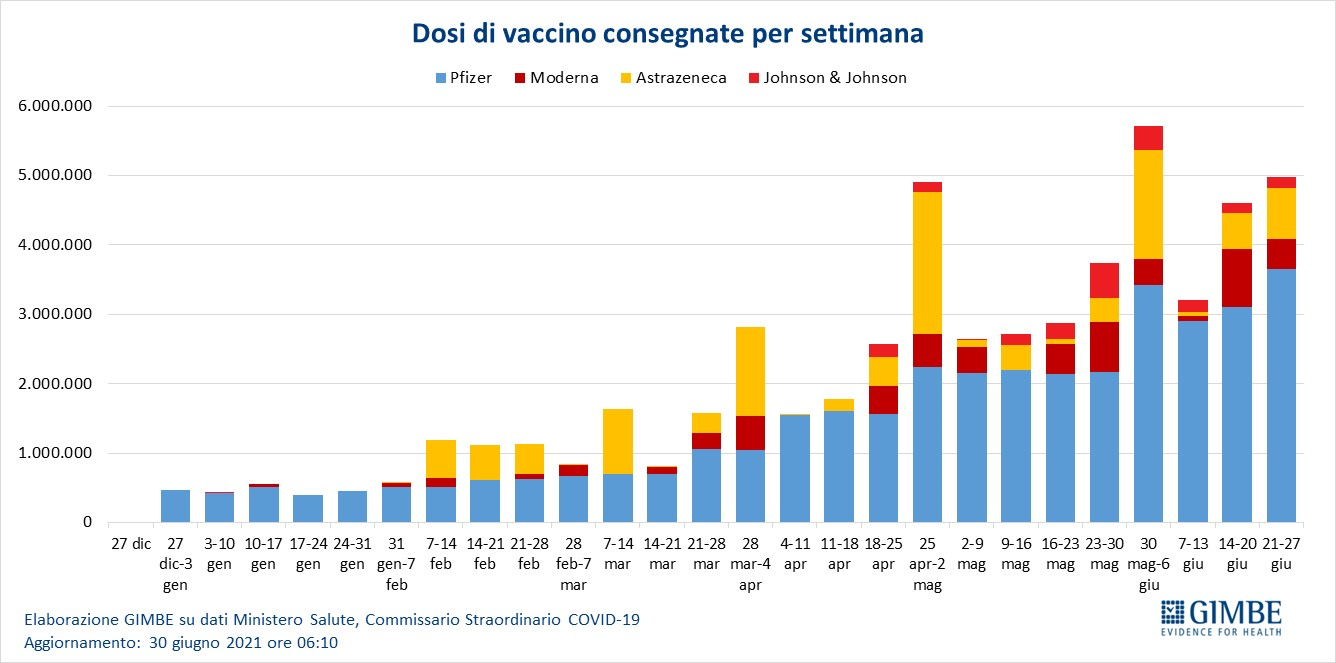
"Compared to the supplies estimated in the vaccination plan – explains the President – about 20.9 million doses would remain to be delivered, 27.4% of those originally planned: even without considering the CureVac vaccine which did not successfully pass clinical tests. , in the absence of further deliveries during the week, the 2nd quarter will close with over 13.6 million doses less ».
Vaccines: administrations.
As of 30 June (updated at 6.10), 57.1% of the population received at least one dose of vaccine (no.33.823.702) and 31.1% completed the vaccination cycle (no.18.410.229) (figure 7). In the last week 3,823,828 million doses were administered (figure 8), a slight increase (+ 1.6%) after the decrease of the previous week: however, 4,294,989 million doses are still “in the fridge”. The 7-day moving average stands at 541,210 inoculations / day (Figure 9).
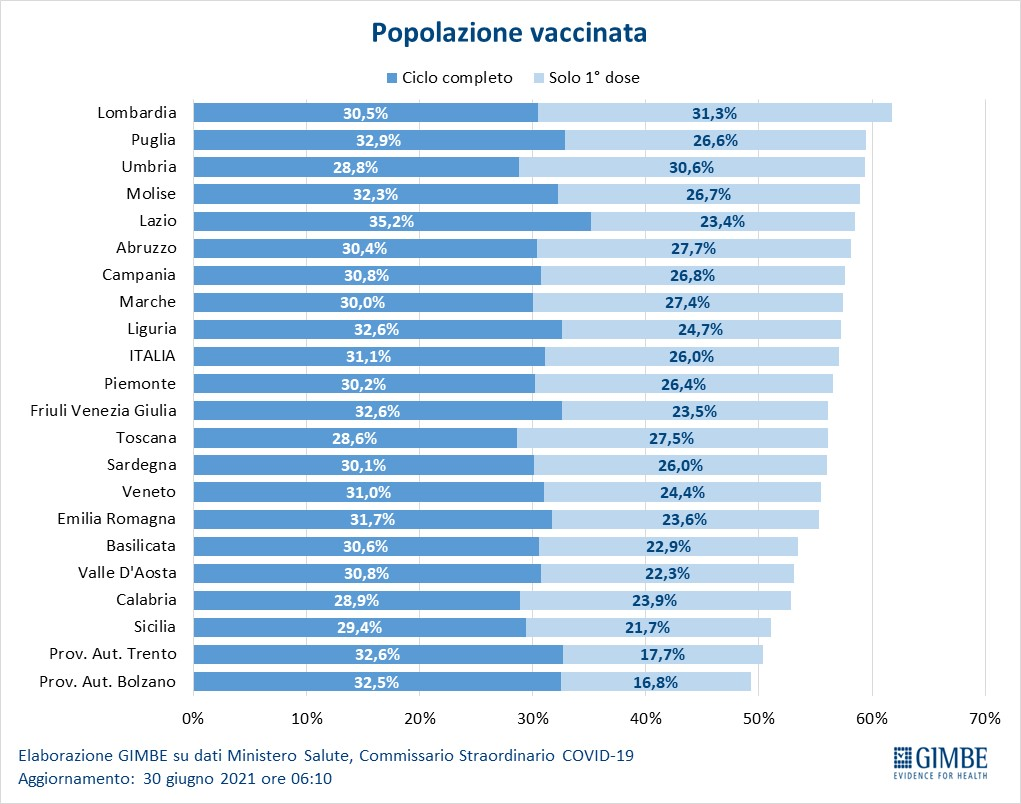
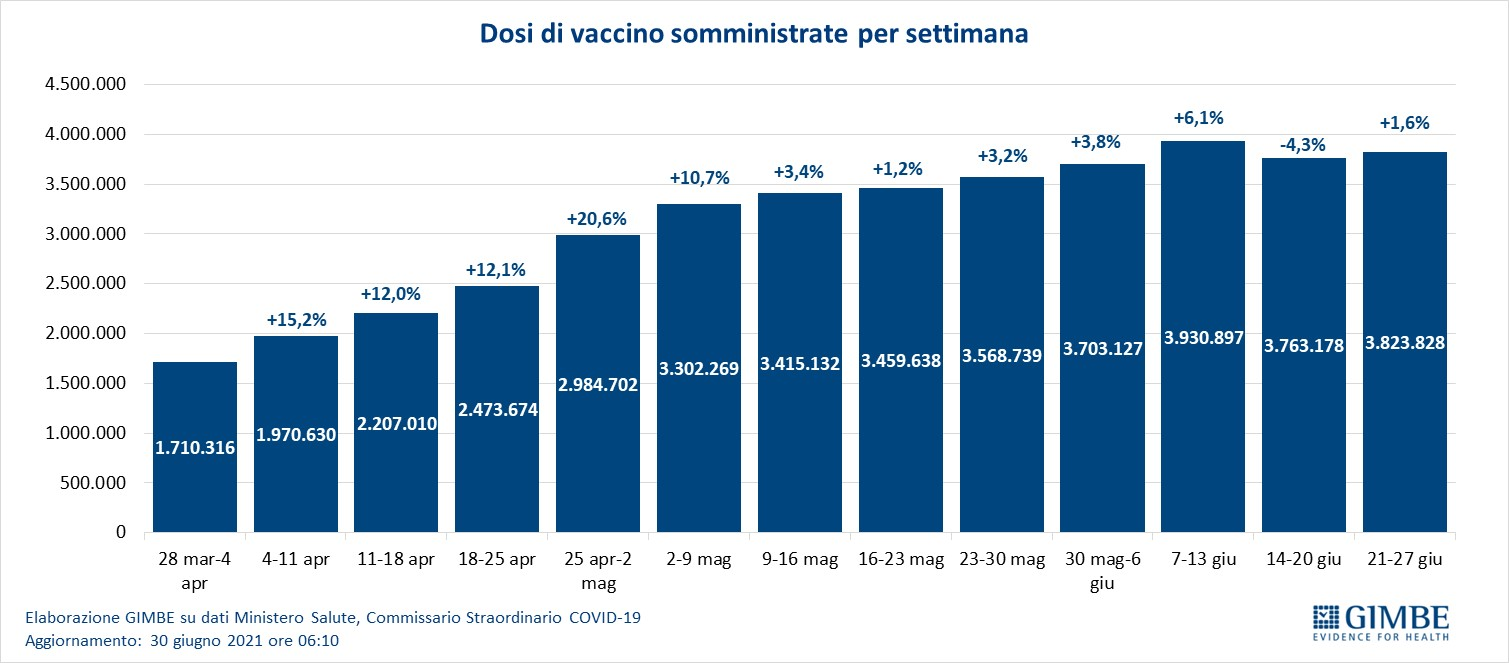
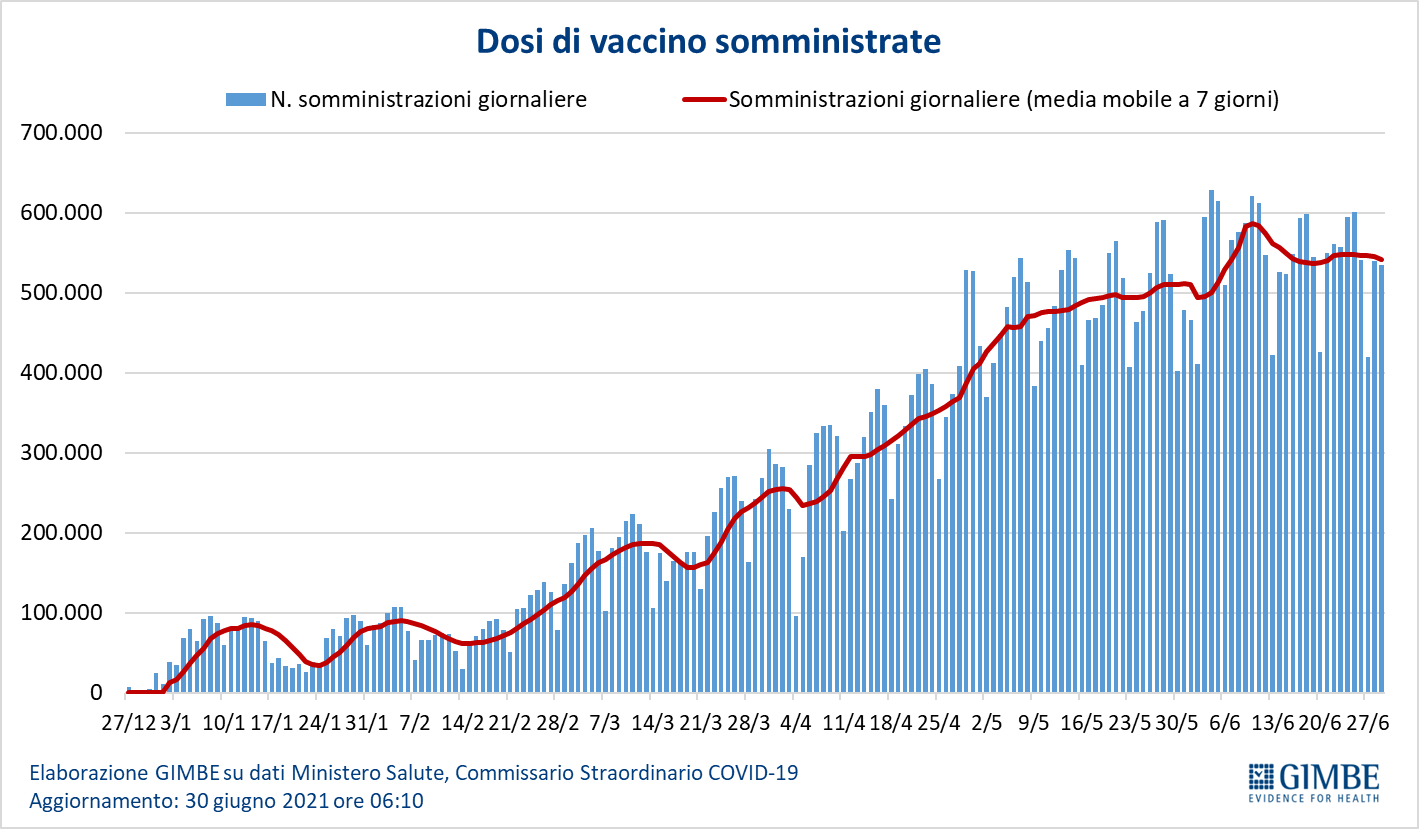
Vaccines: coverage of over 60s.
86.7% received at least the first dose of vaccine, with some regional differences: if Puglia, Umbria and Lazio have exceeded 90%, Sicily stops at 76.2%. In detail:
- Over 80: of the over 4.4 million, 3,930,326 (87.7%) completed the vaccination course and 273,892 (6.1%) received only the first dose (Figure 10).
- Age range 70-79: of the over 5.9 million, 3,365,081 (56.4%) completed the vaccination cycle and 1,860,324 (31.2%) received the first dose only (Figure 11).
- Age range 60-69: of the over 7.3 million, 3,557,990 (47.8%) completed the vaccination course and 2,514,299 (33.8%) received the first dose only (Figure 12).
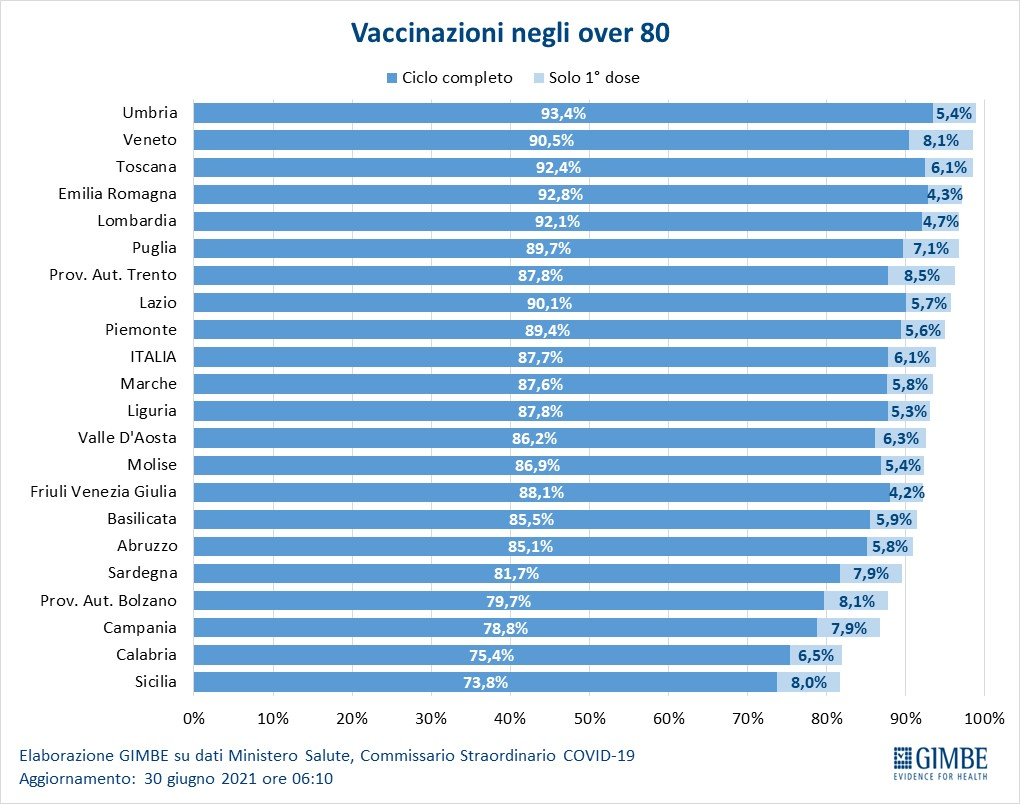
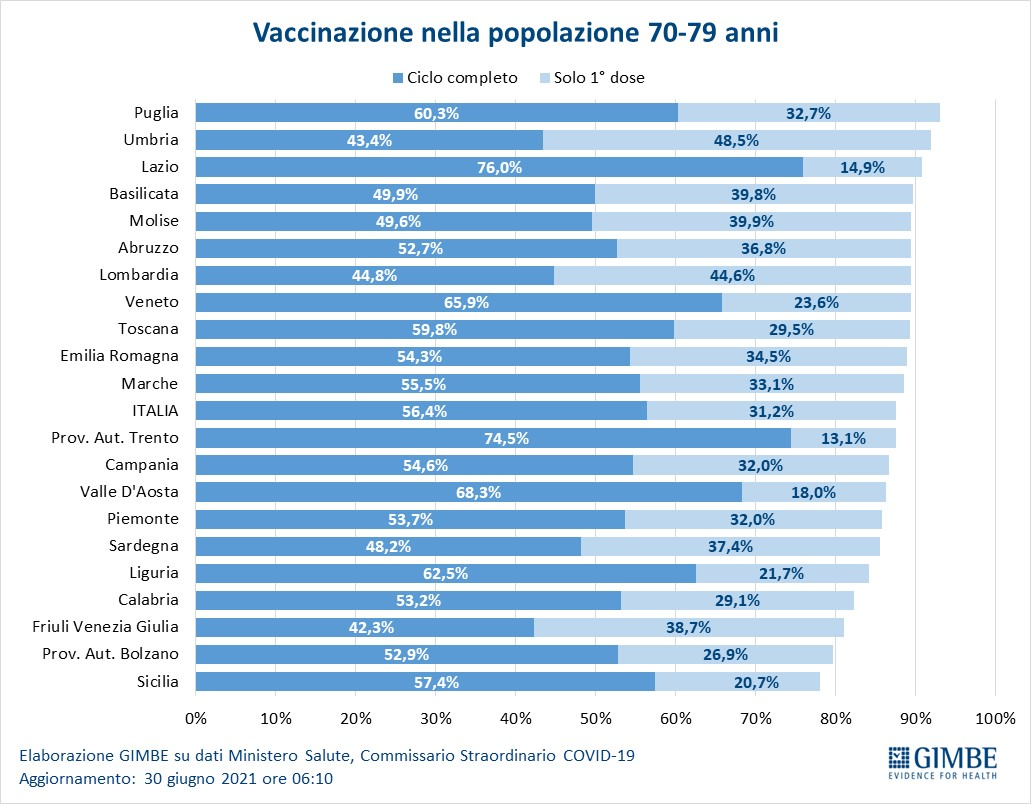
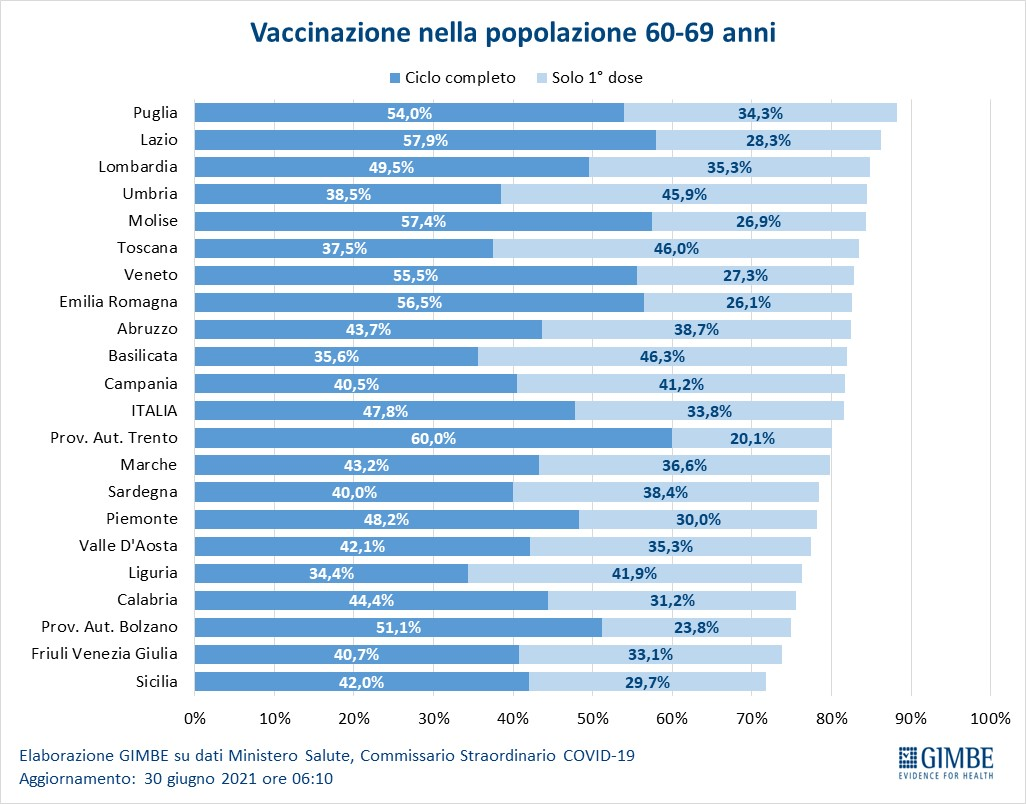
There are 2,384,966 (13.3%), therefore, the over 60s who have not received even a dose of vaccine, with significant regional differences: from 23.8% in Sicily to 8.1% in Puglia (figure 13). Moreover, the trend of vaccination coverage by age group now confirms the flattening of the curves of the over 80s and the 70-79 and 60-69 age groups, as well as recording a sharp decline in the last three weeks for the 50-59 age group, already with coverage of less than 70% (figure 14).
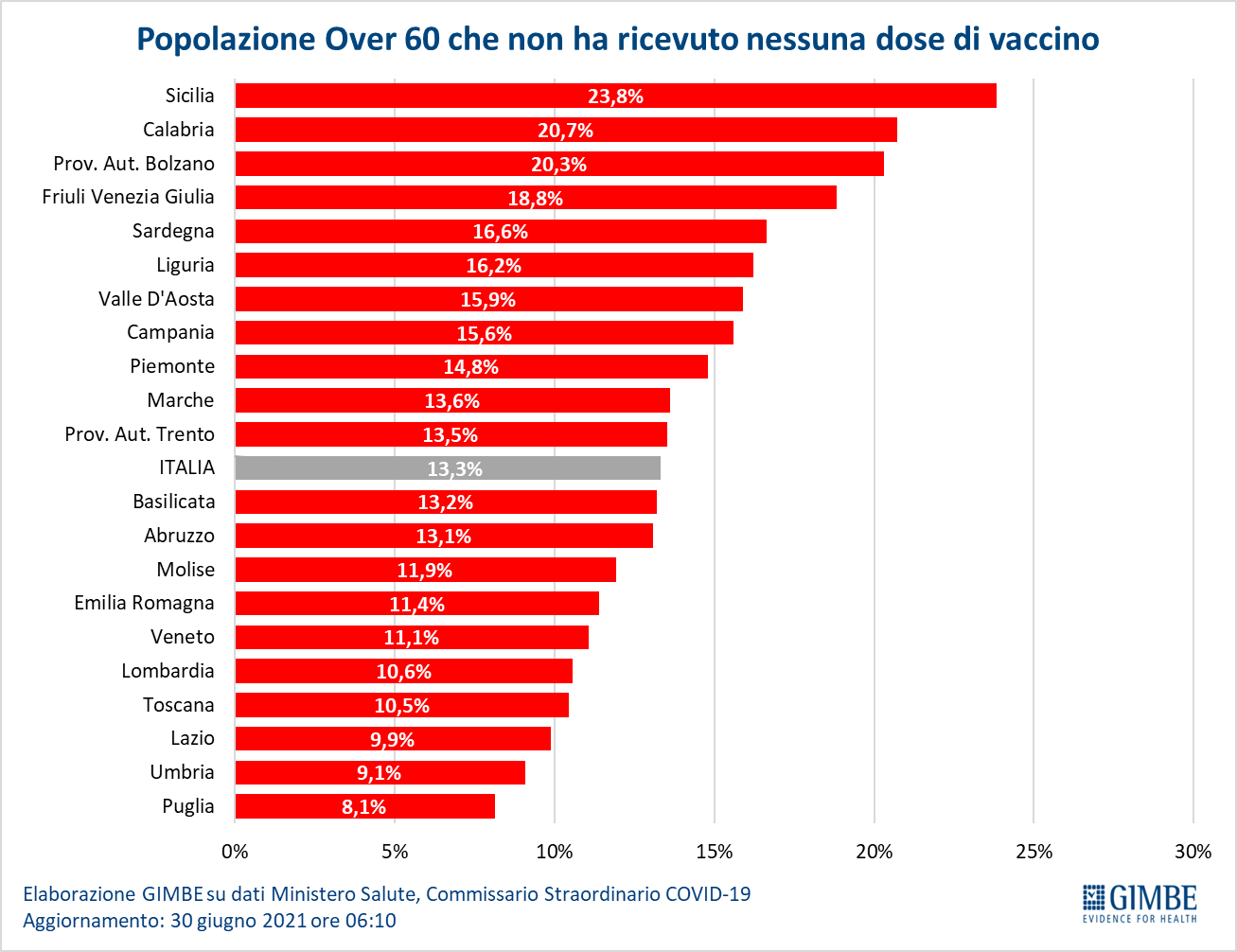
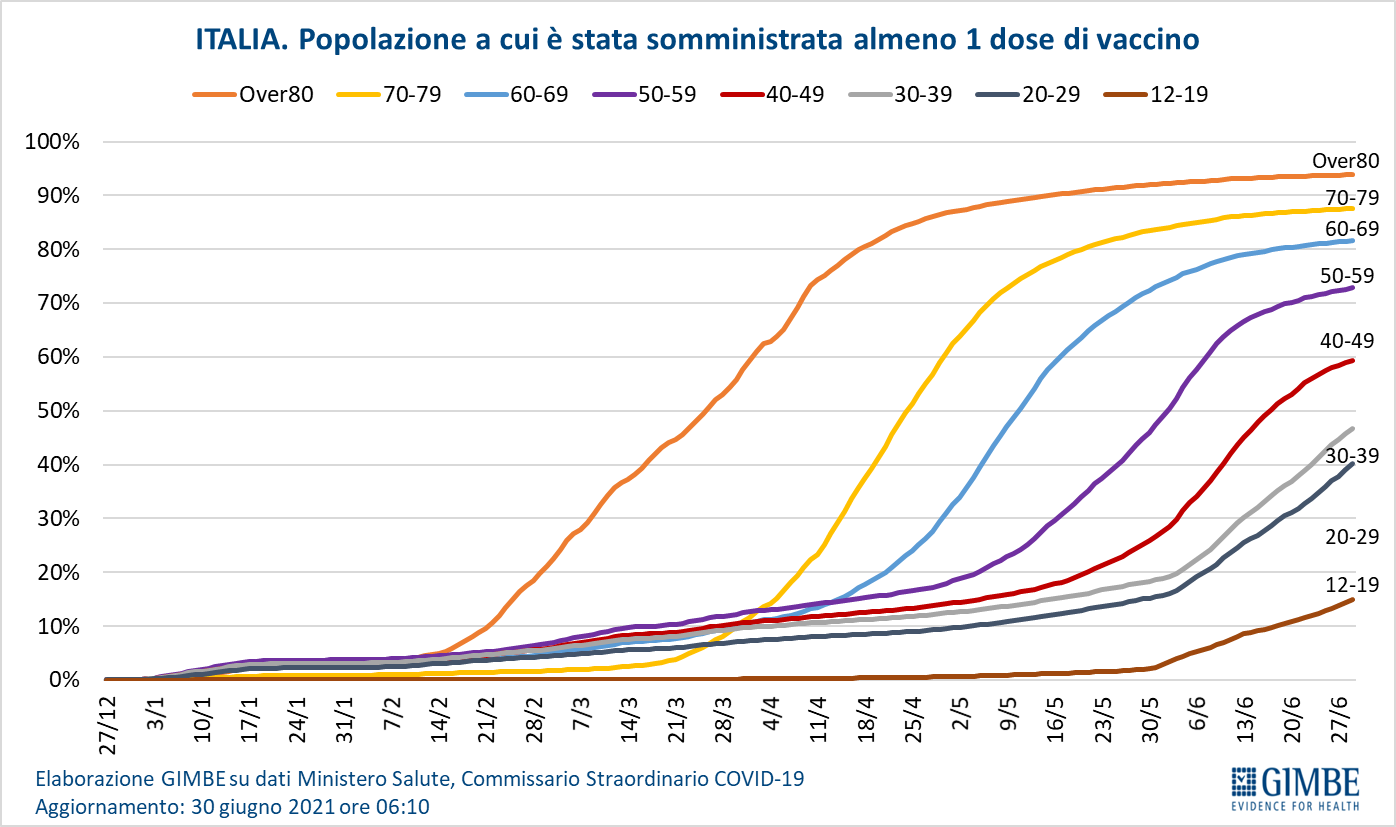
Delta variant and vaccination strategy. To date of the 17,886,878 over 60, 2,384,966 (13.3%) have not yet received even a dose of vaccine and 4,648,515 (26.0%) are waiting to complete the cycle with the second dose: 3,154 .159 with AstraZeneca, 1.286.101 with Pfizer-BioNTech and 208.255 with Moderna: in all, there are therefore more than 7 million people over 60 partially or totally exposed to the risk of serious illness who do not have adequate coverage against the variant.
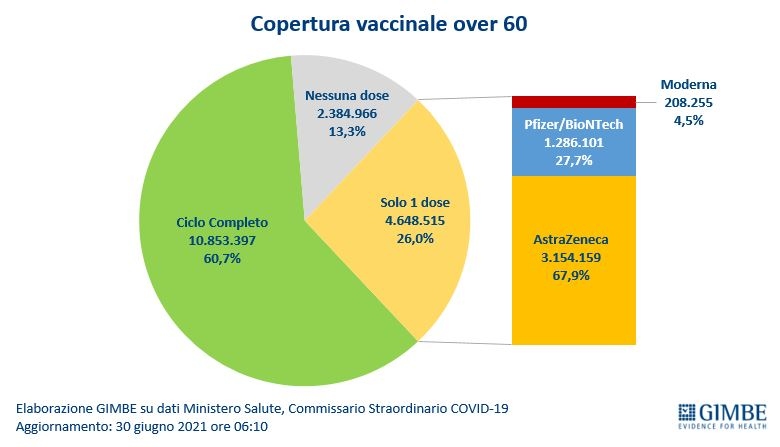
"While not currently knowing the exact prevalence of the delta variant in Italy – explains Gili – its greater contagiousness and, above all, the documented limited efficacy of a single dose of vaccine require a re-evaluation of vaccination strategies to minimize the clinical impact and the one on health services ". Two priority objectives: on the one hand, to reach the largest possible number of over 60s who have not yet received even a dose of vaccine, on the other hand to anticipate the administration of the second dose in this age group as much as possible. However, if for mRNA vaccines the minimum interval between the two doses can be brought back to the original one (21 days for Pfizer-BioNTech and 28 days for Moderna), this is the case with AstraZeneca. In fact, if the recall would be formally permitted by the indications of the package leaflet starting from the fourth week following the first administration, ministerial circular no. 5079 of February 9, 2021 recommends an optimal interval of 10-12 weeks to ensure greater efficacy of the vaccine.
Following these assessments, the Gimbe Foundation proposes to reshape the vaccination campaign for over 60s as follows:
-First doses: offer only mRNA vaccines, both to increase adherence to the campaign strongly compromised by the mistrust of viral vector vaccines, and to prevent new vaccines from being exposed to the delta variant for the next 10-12 weeks without adequate coverage;
– Second doses:
- Pfizer-BioNTech and Moderna: administer the second dose at 21 and 28 days respectively, anticipating the recalls set at longer intervals;
- AstraZeneca: extend the Aifa authorization to offer heterologous vaccination also to over 60s (currently off label), thus allowing the second dose to be brought forward 8 weeks after the first. Alternatively, maintaining the full course with AstraZeneca, stricter non-pharmacological measures should be reinstated to protect those over 60 not adequately covered by the single dose against the delta variant.
"If to counter the spread of the delta variant – concludes Cartabellotta – local services must return to the field by enhancing contact tracing, sequencing and screening at the borders, to limit the impact of severe Covid-19 and hospitalizations, it is necessary to accelerate the administration of the second dose in the over 60s. But a univocal strategic choice is needed, without leaks forward by the Regions, aligned with the authorized indications of vaccines and adequately communicated to the population, also because, in relation to the stocks of vaccines available, new vaccinations and recalls of the under 60s could having to suffer a slowdown ».
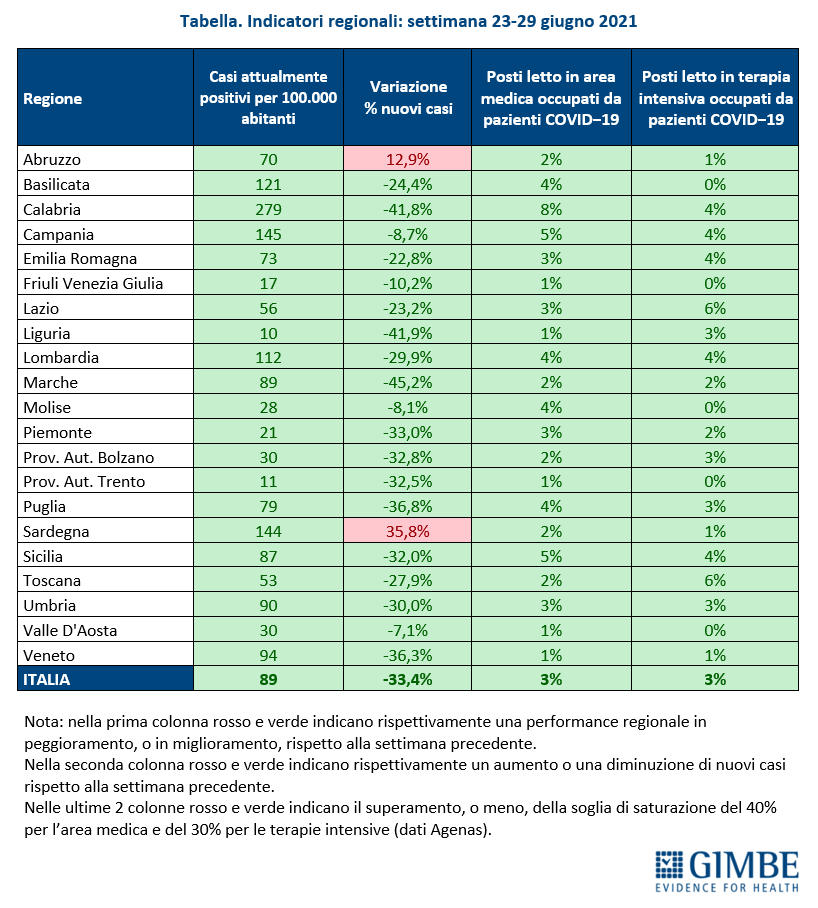
This is a machine translation from Italian language of a post published on Start Magazine at the URL https://www.startmag.it/sanita/come-rimodulare-la-campagna-vaccinale-per-gli-over-60-report-gimbe/ on Thu, 01 Jul 2021 07:52:47 +0000.
